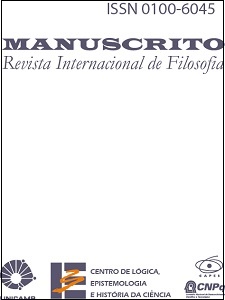Resumo
In his “Logic, Language, and Knowledge” Chateaubriand denounces the tyranny of belief (Chapter 22), but takes some positions on knowledge and justification (Chapter 24) which seem to be too exacting. The fact that Chateaubriand derives constraints on the notion of justification by a close parallel to the notion of proof makes it unnecessarily loaded with the individual, rather than with the collective perspective. His position seems to leave little room for common knowledge, collective knowledge and usual common-sense knowledge, and absolutely no room for explaining how people take correct decisions based on apparently faulty notions of knowledge and justification.
Resumo:
Em “Logic, Language, and Knowledge” Chateaubriand denuncia a tirania da crença (Capítulo 22), mas toma posições sobre conhecimento e justificação (Capítulo 24) que parecem demasiado exigentes. O fato de Chateaubriand derivar condições sobre a noção de justificação a partir de uma estreita analogia com a noção de prova torna a noção de justiticação desnecessariamente carregada com a perspectiva indivídual, em detrimento da perspectiva coletiva. Sua posição parece deixar pouco espaço para noções como conhecimento comum, conhecimento coletivo e senso comum, e absolutamente nenhum espaço para explicar como as pessoas tomam decisões corretas com base em noções aparentemente errôneas de conhecimento e de justificação.
Palavras chave: Conhecimento. Justificação. Conhecimento comum. Conhecimento coletivo. Senso comum. Tomada de decisões.
Referências
AUMANN, R. J. “Agreeing to disagree”. The Annals of Statistics, v. 14, n. 6, pp. 1236-1239, 1976.
BACON, F. The Advancement of Learning (1605). Project Gutenberg. http://www.gutenberg.org/ebooks/5500 [3] DRETSKE, F. Knowledge and the Flow of Information. The MIT Press, 1981.
HODGES, H., HODGES, W., van BENTHEM, J. “Logic and psychology”. Topoi, 26, pp. 1-2, 2007.
LEWIS, D. Convention: A Philosophical Study. Harvard University Press, 1969.
MALONEY, J. C. “Dretske on Knowledge and Information”.
Analysis, v. 43, n. 1, pp. 25-28, 1983.
ROSSI, P. A Chave Universal. Artes da memorização e lógica combinatória desde Lúlio até Leibniz. Bauru: EDUSC, 2004.
SUROWIECKI, J. The Wisdom of Crowds. Anchor Books, 2005.
van BENTHEM, J. “Logic and reasoning: do the facts matter?”. Studia Logica, special volume “Logic and the New Psychologims”. Guest editor Hannes Leitgeb, in print.

